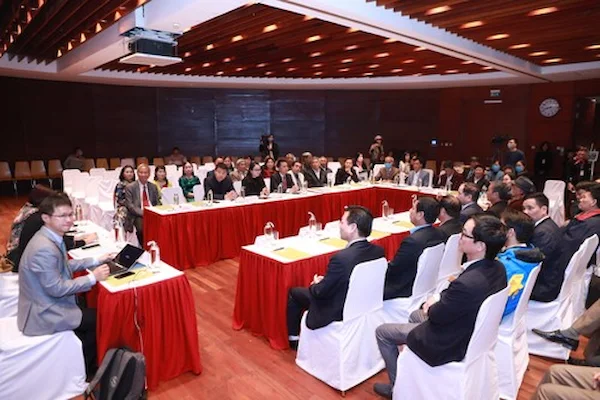Adapting to Vietnamese Work Culture as an Expat
As an expat, navigating the Vietnamese work culture can be both exciting and challenging. At Jobinvietnam.net, we understand the importance of cultural adaptation for a successful career in Vietnam. In this article, we’ll explore the key aspects of Vietnamese work culture and provide insights to help you thrive in your professional journey.

Embracing Collectivism
One of the most striking features of Vietnamese work culture is its emphasis on collectivism. In contrast to the individualistic approach common in Western countries, Vietnamese professionals value harmony, cooperation, and group success. As an expat, it’s crucial to embrace this mindset and prioritize building strong relationships with your colleagues.
To foster a sense of belonging, engage in team-building activities and show genuine interest in your coworkers’ lives. Attend company events, participate in group discussions, and lend a helping hand whenever possible. By demonstrating your commitment to the team, you’ll earn trust and respect from your Vietnamese colleagues.
Respecting Hierarchy
In Vietnamese workplaces, hierarchy plays a significant role. Age, seniority, and titles are highly regarded, and it’s essential to show respect to those in positions of authority. When interacting with your superiors, use proper titles and address them with deference.

During meetings or discussions, be mindful of the hierarchical structure. Wait for your turn to speak and avoid interrupting or challenging your superiors directly. If you have concerns or disagreements, approach them privately and diplomatically, focusing on finding solutions rather than assigning blame.
Building Personal Connections
Vietnamese professionals place great value on personal relationships in the workplace. Building strong connections with your colleagues can lead to smoother communication, increased trust, and better collaboration. Take the time to get to know your coworkers beyond their professional roles.
Engage in small talk, share meals together, and show interest in their personal lives. Attend social gatherings and participate in team-building activities to strengthen your bonds. Remember, in Vietnam, business often relies on the strength of personal relationships, so invest time and effort in nurturing these connections.
Navigating Communication Styles
Communication styles in Vietnamese workplaces may differ from what you’re accustomed to. Indirect communication is common, and maintaining harmony is prioritized over direct confrontation. Pay attention to nonverbal cues, such as facial expressions and body language, as they can convey important messages.

When communicating with your colleagues, be mindful of your tone and word choice. Avoid being too blunt or aggressive, as it may be perceived as disrespectful. Instead, use a more subtle and diplomatic approach, focusing on finding common ground and reaching consensus.
Embracing Flexibility
Vietnamese work culture often values flexibility and adaptability. Plans and schedules may change at short notice, and being able to adjust quickly is crucial. Embrace a flexible mindset and be open to last-minute changes or unexpected requests.
Demonstrate your willingness to go above and beyond when needed, and be proactive in offering assistance to your colleagues. By showcasing your adaptability and team spirit, you’ll earn the respect and appreciation of your Vietnamese coworkers.
Learning the Language
While English is widely spoken in Vietnamese workplaces, making an effort to learn the Vietnamese language can greatly enhance your cultural adaptation. Even basic phrases and greetings can demonstrate your respect for the local culture and your commitment to integrating into the workplace.
Consider enrolling in Vietnamese language classes or finding a language exchange partner to practice with. Your colleagues will appreciate your efforts, and it will open doors to deeper connections and better understanding of the nuances of Vietnamese communication.
Seeking Guidance and Support
Adapting to a new work culture can be overwhelming at times, but remember that you’re not alone. Seek guidance and support from your colleagues, superiors, or even fellow expats who have successfully navigated the Vietnamese work environment.
Don’t hesitate to ask questions, seek clarification, or request feedback on your performance. Your colleagues will appreciate your willingness to learn and grow, and they’ll be more than happy to provide guidance and support along the way.
Vietnamese Business Customs for Expats

When it comes to Vietnamese business customs, there are several key aspects that expats should be aware of. Business meetings in Vietnam often begin with small talk and building personal connections before delving into the main agenda. Gift-giving is a common practice, and it’s essential to present and receive gifts with both hands as a sign of respect. Business attire tends to be formal, with conservative clothing choices being the norm. Punctuality is highly valued, so make sure to arrive on time for meetings and appointments. Lastly, building trust and fostering long-term relationships are crucial for successful business partnerships in Vietnam.
To dive deeper into the intricacies of Vietnamese business customs, be sure to read our comprehensive article on Vietnamese Business Customs for Expats.
Conclusion
Adapting to the Vietnamese work culture as an expat requires patience, open-mindedness, and a willingness to learn. By embracing collectivism, respecting hierarchy, building personal connections, navigating communication styles, embracing flexibility, learning the language, and seeking guidance, you’ll be well-equipped to thrive in your professional journey in Vietnam.
At Jobinvietnam.net, we’re committed to supporting expats in their career aspirations. If you have any questions or need further assistance, don’t hesitate to reach out to us via phone, Zalo, or WhatsApp. Our team is ready to provide you with the clearest and most detailed advice to ensure your success in the Vietnamese workplace.


